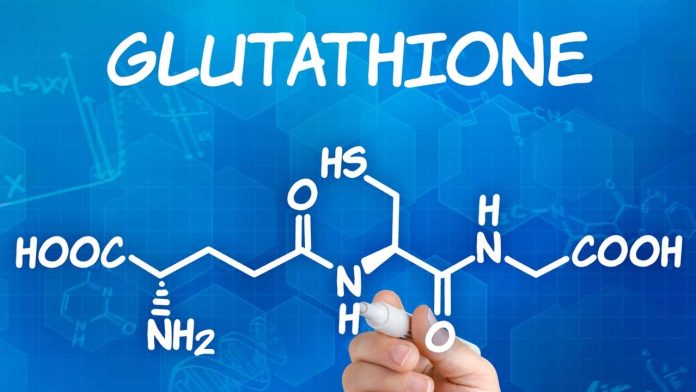Glutathione powder has emerged as a highly desirable ingredient in the global cosmetics market, particularly in skin-whitening and brightening recipes. Being a naturally occurring antioxidant in every cell of the human organism, glutathione is central in free radical neutralization, detoxification, and melanin production regulation. In the cosmetic sector, producers use reduced glutathione powder for skin whitening to develop products that serve to boost a fairer and even-toned complexion. The development of its popularity is based on scientific studies and bioengineering that guarantee the quality of products, their stability, and safety.
Glutathione as a Skin-Whitening Chemical
The effects of glutathione on the melanin production pathway are mostly thought to contribute to the skin-whitening effects of glutathione. Melanin is a pigment in the skin that is formed by an enzyme called tyrosinase. The production of dark melanin into light pheomelanin is affected by glutathione in this process of the enzyme. The reduced type of glutathione, which is the most active form used in cosmetics, is due to its good antioxidation and reaction with the tyrosinase system. The process helps to reduce pigmentation and helps to take away the darker color of the skin to have a lighter and more even tone.
Glutathione in the Reduction of Oxidative Stress
One of the most important functions of glutathione in skin care is the ability of this compound to reduce oxidative stress. Production of melanin in response to the action of free radicals created by UV radiation, pollution, and lifestyle could produce dark spots and unnatural tone. The glutathione neutralizes these free radicals and prevents the oxidative damage and resultant hyperpigmentation. By keeping the cellular environment within the skin, glutathione can be of use to keep the skin clear and help make the skin more radiant. Protective and corrective effects are attained with cosmetic preparations, in which glutathione powder is incorporated.
Enhancing the Performance of Brightening and Anti-Aging
Modern cosmetic manufacturers have been eager to employ glutathione powder as a popular ingredient because of two effects it has, namely brightening and anti-aging. Glutathione is an antioxidant that improves the overall radiance of the skin by improving the cell turnover process and the natural repair process. Its cleansing effect helps to remove the unwanted constituents that cause the skin to become dull, and its controlling effect on the melanin production reduces its pigmentation at its source. Glutathione is also known to preserve collagen through the reduction of inflammatory and oxidative breakdown and can therefore be used in the anti-aging formula to increase the firmness, smoothness, and brightness.
Cosmetic Brands: Interested in Reduced L-Glutathione Powder
The high-quality reduced L-glutathione powder is to be used in cosmetic formulations because it is more purified, more stable, and more bioactive. The fact that the manufacturers employ glutathione, which is the by-product of the fermentation process, is due to the consistency of the quality and safety of the product. The reduced amount of glutathione exists in its active form, hence it is still capable of functioning as an antioxidant and regulator of melanin. It also easily dissolves in creams, serums, lotions, and skin whitening masks due to its fine texture structure. It may also be applied alongside other active ingredients, such as vitamin C, niacinamide, and alpha arbutin, enabling brands to create very versatile brightening products.
Application of Powdered Glutathione in Cosmetic Products
Glutathione is being widely used in most skin whitening and lightening products. It is normally used with whitening serums that target hyperpigmentation and dark spots. Skincare products with glutathione help to keep the skin color on a day-to-day basis and have lasting improvements in brightening the skin.
The use of glutathione in sheet masks is also common in many brands to achieve an immediate radiance. In further developed formulations, glutathione can be encapsulated or incorporated into other forms of delivery to achieve better absorption and performance on the skin. Cosmetic companies can use such applications to address consumers’ needs for mildly effective skin-whitening products.
Quality and Safety Issues of Formulating with Glutathione
In the case of cosmetic manufacturers, ingredient quality is the key to safe and effective products. The supplier of Glutathione powder should be reputable with good production and testing practices. The purities are high so that the antioxidant activity of the powder is retained, and it does not degrade during formulation. Since glutathione is a sensitive compound to light and heat, it should be stored and handled well. Under its right use, it is acknowledged that reduced glutathione is safe and well-tolerated, and hence a trusted ingredient in the global skin care markets.
Conclusion
Glutathione powder is a potent element of the current skin whitening formulae because it is a good antioxidant and can suppress the synthesis of melanin. It can assist cosmetic brands to provide effective, science-based whitening solutions by decreasing oxidative stress, increasing skin brightness, and maintaining overall evenness of complexion. It is a very desirable ingredient for manufacturers who wish to develop high-quality whitening and brightening products due to its stability, compatibility with other active ingredients, and wide usage possibilities. Glutathione powder is one of the primary components of high-level cosmetic formulations, as more consumers are interested in safe and natural skin care.













